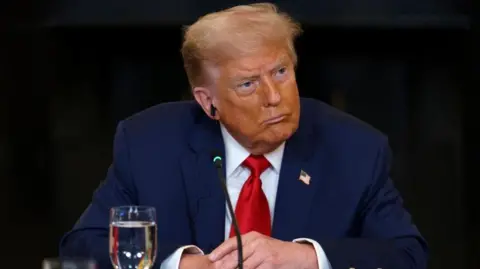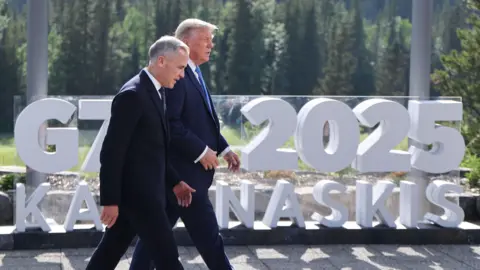Trump threatens 35% tariffs on Canadian goods
 EPA
EPAUS President Donald Trump has said he will impose a 35% tariff on Canadian goods starting on 1 August, even as the two countries were days away from a self-imposed deadline to reach a new trade deal.
The announcement came in the form of a letter published on Trump's social media platform Truth Social, along with additional threats of blanket tariffs of 15% or 20% on most trade partners.
Canadian Prime Minister Mark Carney said his government would continue to protect his country's workers and businesses as they head towards the new deadline.
Trump has sent more than 20 such letters to other US partners this week. He also says he will soon announce new tariffs on the European Union.
Like Canada's letter, Trump has vowed to implement those tariffs by 1 August.
A blanket 25% tariff has already been imposed on some Canadian goods, with the nation also hit hard by Trump's global steel, aluminium and auto tariffs - though there is a current exemption in place for goods that comply with a North American free trade agreement.
It is unclear if the latest tariffs threat would also apply to goods covered by the Canada-United States-Mexico Agreement (CUSMA).
Trump has also imposed a global 50% tariff on aluminium and steel imports, and a 25% tariff on all cars and trucks not built in the US.
He also recently announced a 50% tariff on copper imports, scheduled to take effect next month.
Canada sells about three-quarters of its goods to the US, and is an auto manufacturing hub and a major supplier of metals, making the US tariffs especially damaging to those sectors.
- Asia is reeling from Trump's tariff salvo – is anyone winning?
- 'In business, indecision is killer' - Canadian firms seek certainty in tariff war
Trump's letter said the 35% tariffs were separate to those sector-specific levies.
"As you are aware, there will be no tariff if Canada, or companies within your country, decide to build or manufacture products within the United States," Trump stated.
He also tied the tariffs to what he called "Canada's failure" to stop the flow of fentanyl into the US, as well as Canada's existing levies on US dairy farmers and the trade deficit between the two countries.
"If Canada works with me to stop the flow of Fentanyl, we will, perhaps, consider an adjustment to this letter. These Tariffs may be modified, upward or downward, depending on our relationship with Your Country," Trump said.
President Trump has previously accused Canada - alongside Mexico - of allowing "vast numbers of people to come in and fentanyl to come in" to the US.
In his response on X, Carney said Canada had made essential progress to "stop the scourge of fentanyl" in North America, and that his government was committed to continuing to work alongside the US to protect communities in both countries.
According to data from the US Customs and Border Patrol, only about 0.2% of all seizures of fentanyl entering the US are made at the Canadian border. Almost all of the rest is confiscated at the US border with Mexico.
Earlier this year, Canada also announced more funding towards border security and had appointed a fentanyl czar in response to Trump's complaints.
 EPA
EPACanada has been engaged in intense talks with the US in recent months to reach a new trade and security deal.
At the G7 Summit in June, Carney and Trump said they were committed to reaching a new deal within 30 days, setting a deadline of 21 July.
Trump threatened in the letter to increase levies on Canada if it retaliated. Canada has already imposed counter-tariffs on the US, and has vowed more if they failed to reach a deal by the deadline.
In late June, Carney removed a tax on big US technology firms after Trump labelled it a "blatant attack" and threatened to call off trade talks.
Carney said the tax was dropped as "part of a bigger negotiation" on trade between the two countries.
